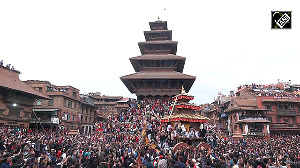 Former Army Chief Gen V K Singh, who has courted controversy over secret military intelligence unit Technical Support Division, on Monday slammed its winding up, saying people "inimical" to India's security would be happy.
Former Army Chief Gen V K Singh, who has courted controversy over secret military intelligence unit Technical Support Division, on Monday slammed its winding up, saying people "inimical" to India's security would be happy.
Justifying creation of the specialised snooping unit, he said if it had not been disbanded, it would have been helpful in preventing a number of things happening on the border.
"I think the people who would be most happy with it being wound up, it would be people who are inimical to India's national security," Singh told PTI in an interview.
He was responding to a question whether he agreed with the criticism of the unit which was reportedly accused of undertaking some nefarious activities, such as snooping of defence ministry officials and attempt to destabilise Jammu and Kashmir government.
The unit was set up during Gen V K Singh's tenure as army chief between April 2010 and May last year. It was wound up soon after his retirement.
It was scrapped after a high-level committee headed by Director General Military Operations Lt Gen Vinod Bhatia recommended so along with a Central Bureau of Investigation inquiry into its activities.
"If TSD had not been wound up, a lot of things that are happening on the border, would not have happened," Gen Singh asserted. He, however, did not elaborate.
Commenting on allegations that the TSD was trying to destabilise the Jammu and Kashmir government, he said these comments are “laughable”. “If someone can write in a report that one crore was meant to destabilise the state government, that person does not have any brains."
During the interview, the former army chief spoke about a number of other issues like his age controversy which had reached the Supreme Court, his allegations about attempt to bribe him to clear purchase of Tatra trucks and accusations against him for attempting coup in January last year.
In his autobiography 'Courage and Convictions', Gen V K Singh has stated that the recommendation for raising the secret military intelligence unit was made by National Security Adviser to hit back at Pakistan after the 26/11 attacks in Mumbai in 2008.
On allegations that the unit was involved in some unwanted activities, the former army chief said, "A lie has many friends and truth has none...I have just said that people who will be very happy is the people who harm national interest."
Singh claims in the book that the NSA had asked then Army Chief Deepak Kapoor if the army could create an organisation with covert capability to hit back at Pakistan but Kapoor was not receptive to the project.
The proposal was then made to him by the then Director General Military Intelligence Lt Gen RK Loomba, he writes in the book.
The intent was to increase the scope of the proposed intelligence unit to have tentacles in neighbouring countries and surrounding areas, the book says.
The unit has been mired in controversy after allegations were levelled against it that it was involved in snooping the telephones of important officers in the Defence Ministry and carrying out unauthorised operations in Jammu and Kashmir against the state government there.
Singh has alleged in his book that a senior bureaucrat in the Prime Minister's Office had been "orchestrating" activities against him. He has, however, not identified him in the book.
Asked who that bureaucrat was, he said, "You have a suspicion, but then suspicions cannot be put in a book."
On whether he knew the bureaucrat whom he has not named in the book, he said, "I must be knowing."
Terming the senior bureaucrat to be part of the 'Chandigarh think-tank', he alleged that senior journalists from two English dailies were part of it.
He was also asked to identify the "wife of an important political personality" whom he had mentioned in his book as being part of "conspiracy" against him.
"What I have heard, I have written in the book. I had heard that there was a powerful lady. If I had heard the name, I would have mentioned it," Singh replied.
In the book he has mentioned that the thoughts about resigning came to his mind after the case on age issue in the Supreme Court.
"The thought was there. There were two things which made the difference. One was what supreme commander (the then President Pratibha Patil) said."
"Then the other thing was that I thought over the whole thing and said that it will look very petulant. Your whole thing is age and nothing else. You know you are right. And then Gandhiji said there is always a court higher than the courts on earth," he said.
Photograph: Saisuresh Sivaswamy/Rediff.com











 © 2025
© 2025